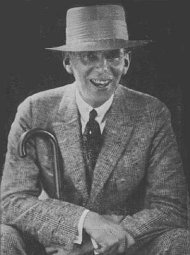
In 1907, Wilson Mizner ran a theatrical hotel in New York.
He posted two rules:
“Carry Out Your Own Dead”
“No Opium Smoking in the Elevator”
“Be nice to people on the way up,” he once said, “because you’ll meet them on the way down.”

In 1907, Wilson Mizner ran a theatrical hotel in New York.
He posted two rules:
“Carry Out Your Own Dead”
“No Opium Smoking in the Elevator”
“Be nice to people on the way up,” he once said, “because you’ll meet them on the way down.”
America’s favorite film monsters, according to a 2005 study by California State University:
“Younger people were the more likely to prefer recent and more violent and murderous slasher monsters, and to like them for their killing prowess. Older people were more attracted to non-slashers and attracted for reasons concerned with a monster’s torment, sensitivity, and alienation from normal society. … Overall, … monsters were liked for their intelligence, superhuman powers and their ability to show us the dark side of human nature.”
The four young stars of Rebel Without a Cause all died prematurely:
See Fallout.
At Frank Sinatra’s funeral, friends and family members were invited to place items of personal significance into his coffin. Reportedly these included:
Why 10 dimes? “He never wanted to get caught not able to make a phone call,” his daughter Tina told Larry King.

Halle Berry was named after a department store.
“My mother was shopping in Halle Brothers in Cleveland,” she told the New York Daily News. “She saw the bags and thought, ‘That’s what I’m going to name my child.'”
(By the way: “No one ever says it right. It’s Halle, like Sally.”)
Marlon Brando and Robert De Niro are the only actors to win Oscars playing the same character. Brando won Best Actor for playing Vito Corleone in The Godfather in 1972, and De Niro won Best Supporting Actor for the same role in The Godfather Part II in 1974.
See Too Much Talent.
When Billy Wilder visited Paris in the 1940s, his wife asked him to buy her a bidet.
After a few days he wired back:
UNABLE OBTAIN BIDET. SUGGEST HANDSTAND IN SHOWER.

In 1956, Cardinal Spellman forbade New York Catholics to see Elia Kazan’s film Baby Doll. Asked whether he himself had seen it, Spellman replied, “Must you have a disease to know what it is? If your water supply is poisoned, there’s no reason for you to drink the water.”
The British Board of Film Censors reported that the 1928 French surrealist film The Seashell and the Clergyman was “so cryptic as to be almost meaningless” … but “if there is a meaning, it is doubtless objectionable.”
“Think for yourselves,” wrote Voltaire, “and let others enjoy the privilege to do so, too.”